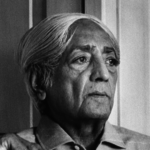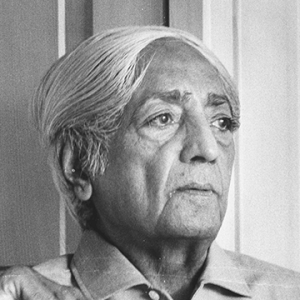 Is there anything sacred in life? Man from time immeasurable has always asked this question: is there something beyond all this confusion, misery, darkness, illusions, beyond the institutions and reforms; is there something really true, something beyond time?
Is there anything sacred in life? Man from time immeasurable has always asked this question: is there something beyond all this confusion, misery, darkness, illusions, beyond the institutions and reforms; is there something really true, something beyond time?
The word meditation has been introduced into the Western world quite recently by some of those people who have accepted certain norms, certain patterns of meditation. There is the Zen meditation, the Tibetan form of meditation which is different from the southern form of Buddhist meditation; there is the meditation of the Hindus, with their special gurus, who again have their own forms of meditation. Then there is the Christian form, which is contemplation. And the meaning of that word is ‘to ponder over, to think over’. And also, a meditative mind must be free of measurement.
So all those people who have brought this word – with their systems, methods and practices, are again put together by careful thought. Perhaps one guru or two – those Asiatic birds – have some kind of experience; immediately that’s translated into some kind of a spiritual status, and they have their meditation. And they come here and you are gullible enough to swallow all that; paying for it – the more you pay, the greater the meditation.
So we ought to enquire into what is meditation – to meditate. It’s really important, because a mind that’s merely mechanistic, as thought is, can never come upon that which is totally, supreme order, and therefore a complete freedom. Like the universe is in total order: it’s only the human mind that is in disorder. And so one has to have an extraordinarily orderly mind, a mind that has understood disorder and is free completely from disorder, which is contradiction, imitation, conformity, and all the rest of it. Such a mind is an attentive mind, completely attentive to whatever it does, to all its actions, in its relationship, and so on and so on.
Attention is not concentration. Concentration is restricted, narrow, limited, whereas attention is limitless. And in that attention there is that quality of silence – not the silence invented by thought, not the silence that comes about after noise, not the silence of one thought waiting for another thought. There must be that silence which is not put together by desire, by will, by thought. And in that meditation there is no controller.
And this is one of the factors in all the so-called meditative groups and the systems they have invented: there is always effort, control, discipline. Discipline means to learn – not to conform – to learn so that your mind becomes more and more subtle, not based on knowledge, learning is a constant movement. So meditation is freedom from the known, which is the measure. And in that meditation, there is absolute silence. Then in that silence alone, that which is nameless is.
Excerpted from krishnamurtiaustralia.org. The 32nd death anniversary of J. Krishnamurti will be observed on February 17
J. Krishnamurti







